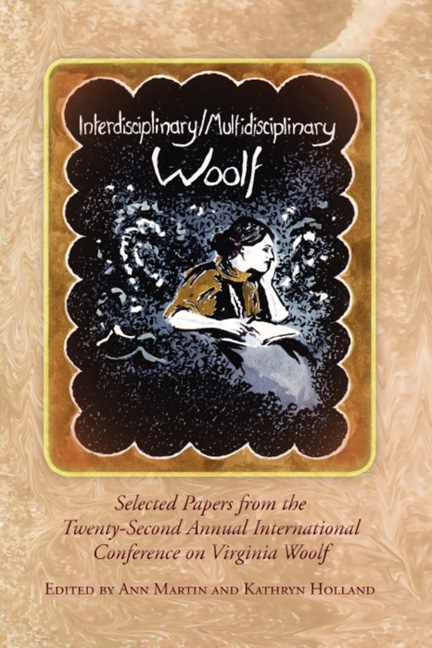Book contents
- Frontmatter
- Contents
- Introduction to Interdisciplinary/Multidisciplinary Woolf
- Acknowledgments
- List of Abbreviations
- History, Materiality, Multiplicity
- Multidisciplinary Woolf / Multiple Woolfs?
- Woolf, History, Us
- “Full of Experiments and Reforms”: Virginia Woolf, John Maynard Keynes, and the Impossibility of Economic Modeling
- Desiring Statues and Ambiguous Sexualities in Jacob's Room
- Challenging the Family Script: Woolf, the Stephen Family, and Victorian Evangelical Theology
- History as Scaffolding: Woolf's Use of The Times in The Years
- Vincent van Gogh, Virginia Woolf, and Old Shoes: A Cross-Cultural Iconography of Historical Truama from the Great War to the Iraq War
- Stopped at the Border: Virginia Woolf and the Criminalization of Dissent in Democratic Societies
- “Q. And babies? A. And babies”: On Pacifism, Visual Truama, and the Body Heap
- Photography, History, and Memoir of the Spanish Civil War: Interdisciplinary Views
- Patterns, Practices, Principles
- Art, Influence, Embodiment
- Publishing, Politics, Publics
- Notes on Contributors
- Conference Program
Photography, History, and Memoir of the Spanish Civil War: Interdisciplinary Views
from History, Materiality, Multiplicity
- Frontmatter
- Contents
- Introduction to Interdisciplinary/Multidisciplinary Woolf
- Acknowledgments
- List of Abbreviations
- History, Materiality, Multiplicity
- Multidisciplinary Woolf / Multiple Woolfs?
- Woolf, History, Us
- “Full of Experiments and Reforms”: Virginia Woolf, John Maynard Keynes, and the Impossibility of Economic Modeling
- Desiring Statues and Ambiguous Sexualities in Jacob's Room
- Challenging the Family Script: Woolf, the Stephen Family, and Victorian Evangelical Theology
- History as Scaffolding: Woolf's Use of The Times in The Years
- Vincent van Gogh, Virginia Woolf, and Old Shoes: A Cross-Cultural Iconography of Historical Truama from the Great War to the Iraq War
- Stopped at the Border: Virginia Woolf and the Criminalization of Dissent in Democratic Societies
- “Q. And babies? A. And babies”: On Pacifism, Visual Truama, and the Body Heap
- Photography, History, and Memoir of the Spanish Civil War: Interdisciplinary Views
- Patterns, Practices, Principles
- Art, Influence, Embodiment
- Publishing, Politics, Publics
- Notes on Contributors
- Conference Program
Summary
When she went to Spain with Leonard in 1923, Virginia Woolf wrote to Vita Sackville-West: “We've had a splendid time up in the Sierra Nevada, staying with a mad Englishman, who does nothing but read French and eat grapes” (L 3 28). That mad Englishman was Gerald Brenan, a Bloomsbury acquaintance and author of The Spanish Labyrinth, first published in 1943—still in print and considered to be a seminal text to the background to the Spanish Civil War (1936-1939). Brenan's wife, Gamel Woolsey, an American writer from South Carolina, wrote a memoir of Spain, Death's Other Kingdom, which describes the impact of the war on the community of Churriana, just outside Malaga in southern Andalusian Spain where she and Brenan lived. Woolf's Three Guineas famously argues that gender issues underlie the structures of war. All three of these works, written within a period of six years of one another, represent distinct interdisciplinary perspectives on the Spanish Civil War: a history, a memoir, and a pacifist polemic with repeated references to photographs.
While Woolf was writing in England, reading about the build-up of war in Spain, the Brenans were looking out their window in their village just outside Malaga and watching Spain burn. The Brenans witnessed the disappearances and deaths of their neighbors and farm workers, all of whom, by and large, were a gentle people, more concerned with getting the crops in than in fighting a revolution. The Brenans’ gardener, Enrique, summed it up: “I am for that party…who let me cultivate my cabbages” (Woolsey 93).
Though each of these three writers contributes to the history of the Spanish Civil War, each also raises questions regarding the nature of knowledge: how do we know what we know? What is the role of myth as we live through and theorize about national and international events, particularly those events that are traumatic or painful? Myth, generally understood as something “made up” and not “real,” is understood by historians and theorists as significant storytelling that helps construct memory of key national and international events. Such storytelling for Woolf, Brenan, and Woolsey was quite literally based on where they were located when the events occurred.
- Type
- Chapter
- Information
- Interdisciplinary/Multidisciplinary Woolf , pp. 73 - 78Publisher: Liverpool University PressPrint publication year: 2013



